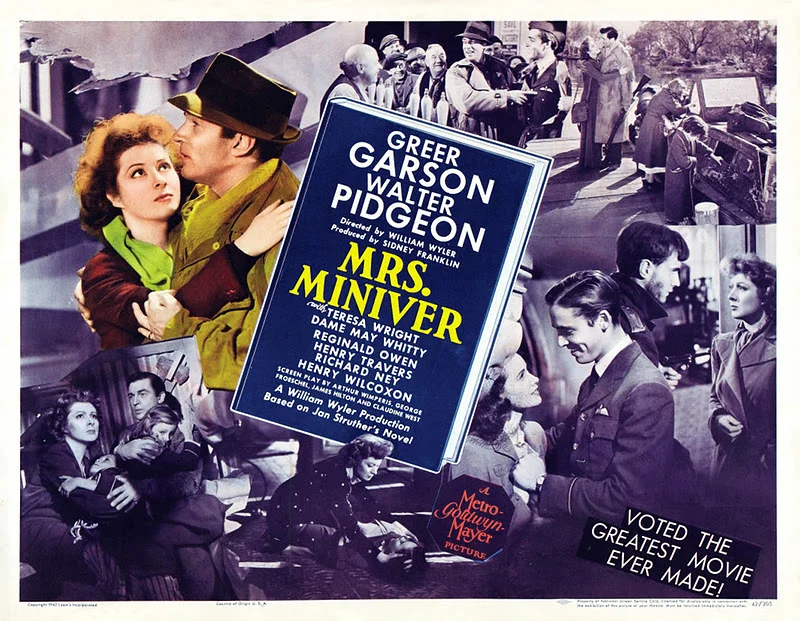Better Late Than Never: "Mrs. Miniver" (1942)
Shaun Cordingley
I've been holding off on writing a few of these "Better Late Than Never" articles when it comes to Best Pictures Winners, as I have been intending on putting together an "Every Best Picture Oscar Winner Ranked" feature on the site for some time, however it is becoming quite apparent that I will not be able to do this in time for this years' Academy Awards...despite my best efforts.
At this point I have seen a good chunk of them (which I am sure we will cover on our Oscars Prediction Podcast next Friday), but just not enough for me to get started, so, I felt that it would be nice to dip back into this feature with the Best Picture Winner (one of 6 Oscars) from the 1943 Oscars, Mrs. Miniver.
Mrs. Miniver is based on the Jan Struther novel of the same name, and is the story of an upper-middle class English family on the outset, and through the Evacuation at Dunkirk, and the start of the Blitz. Set in the (fictional) village of Belham, Mrs. Miniver runs it's war story around Kay Miniver (Greer Garson, who also won an Oscar), and how the war looks from home; her husband Clem (Walter Pidgeon) is part of the local watch, and takes his boat to help at Dunkirk, her eldest son Vin (Richard Ney, future husband of Garson) comes back from Oxford (all jerked up, as we all do from that first semester at University), and then joins the RAF to fight (while falling for the local aristocrats daughter, played by Teresa White, who also won an Oscar), while Mrs. Miniver's daughter and young son are at home, and need to be taken care of.
Essentially what this boils down to is you get to see, through a series of events told over the course of the first year and change of WW2, how the war effects the family, the strains at home, and (as best as could be gotten away with 1942) some of the tragedy found for the people of England, now engaged in "Total War" with Nazi Germany.
Check out the (very 1940s) trailer here:
Mrs. Miniver is, at it's heart, a propaganda film; while it is not overt, it was made with an eye to the fact that the (borderline isolationist) people of the United States were just getting into the war in Europe, and this film served to try to show, while still being a Hollywood production, what it was like for the people of England; particularly how they are a strong, resilient ally, who have been fighting on their own...in an effort to rally the American people around this 'second front'. The end of the credits literally say: "AMERICA NEEDS YOUR MONEY BUY DEFENSE BONDS AND STAMPS EVERY PAY DAY"
Thankfully, the propaganda side of Miniver never becomes tiresome, as it is all centered around a very well acted, and put together story that allows you to get a sense of people from all walks of life in the village, and (at it's heart) it delivers a romantic story on top of the drama of the "home" side of the war.
For a modern audience, there will be some things that are off-putting--the romantic drama is dated, and hits a lot of notes that audiences familiar with melodramas of the era will be very familiar with. This also means that until war is declared, the pace is quite slow, as they need to introduce you to, and give you first impressions of everybody important to the rest of the film. This can feel slow, and a little strange to a modern movie-watcher, so just a heads up--make sure you get to the war before giving up, the pace, and the story kick into gear then.
I almost made a Greer Garson joke there...you're welcome for skipping it.
The accents are atrocious (my God)--some of the actors nail their English accents (Garson, who is English, being one of them), others seem to forget they are doing them and sound like they are from New Brunswick, and others needed to stop trying.
Really needed to stop trying...
Now this may be something that annoys me (classically trained actor) more than it will a regular audience member, but it is something to be aware of.
Also, the youngest children...well children acting in this era was much more hit and miss than it is now, and this....let's just say I have no idea what the wee lad said half the time, but I'm supposing it was supposed to be cute?
However, all of these points aside, this is a great film, with some excellent performances, a twist that I did not see coming, and tells a very interesting and important story. Films about WW2 have always been interesting to me, and there are so few good ones that tackle the home front, and this is one of them--Mrs. Miniver is worth the effort.
You're also in luck: if you have TCM, Mrs. Miniver is showing on February 18, 2017, so you may have a shot at checking this one out soon!
-S (@Shauncord)
PS: There's a sequel called The Miniver Story (1950), which is largely told through flashback, starting at VE Day, which...well, let's just say it was the biggest flop for MGM in 1950.
The film does not recapture the magic of Mrs. Miniver, and for some reason *cough* Garson and Ney's divorce *cough*, their is zero mention of Vin...one of the main characters from the first film, so feel free to skip it.
